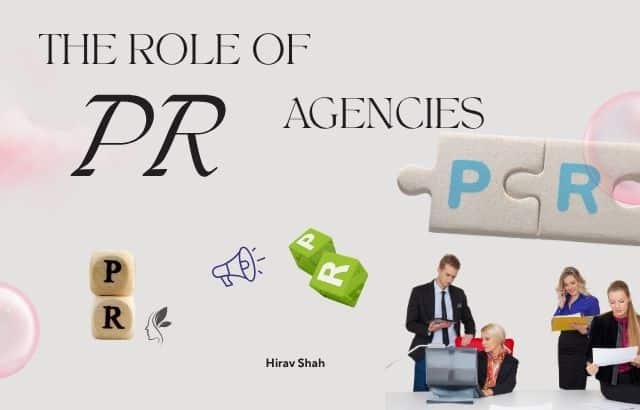PR Companies will use newsworthy information about the brand or business and create press releases and articles, as well as informative and engaging write-ups related to the industry, and use these publications to create greater brand awareness and visibility.
While marketing and advertising aimed at creating visibility through paid means, PR endeavours to do it for free. They will use the many tools, platforms, and techniques that they have available to them to achieve this, and may include social media, using authoritative news sites, as well as influencers, to name just a few, says noted business strategist Hirav Shah.
Table of Contents
What is a PR Company?
“Public relations is a process and practice of people and brands building relationships with journalists, bloggers and podcasts and spreading their message/data to the public by getting press inclusion”.
Basically, this means if no one realizes you exist, you will not have any clients!
“Public relations is a strategic communication process that forms commonly advantageous relationships among associations and their publics“.
Throughout the most recent couple of many years, the ascent of new technologies, social media and new blogs, publications and influencers have reshaped the PR landscape.
Subsequently, the public relations definition has additionally changed.
If you think that you can handle your own PR work for your brand or business, don’t! Because PR is not some simple technique that is used to market your brand, but a very powerful tool that can make or break a business’s reputation among the general public. It doesn’t only involve releasing articles and information about the company or brand, but also crisis management in instances when there is any negative PR being generated, as well as ensuring that the good vibes that are generated for the brand or business are constant and continuous. This is why a partnership with an experienced Public Relations Agency is so vital for a business.
The Role of PR Companies in Business: What They Really Do
1. Carry out research on target markets and buyer personas
If you don’t know who your target audience is, then there is no point in carrying out any marketing or PR work for your brand or business. This should be what your PR Agency does first, as this will determine the best PR strategy that they need to follow in time to come in order to achieve the set goals. Marketing research comes first and then identifying buyer personas. Researching buyer personas will include getting more details on your target audience, such as age, gender, income, interests, hobbies, etc, in order to better understand what kind of publications and strategies will suit the type of market and audience that the business should target to.
2. Targeted press lists
A good PR Agency will carry out extensive research on the ideal publications to target in order to reach the right audience. The type of publications used will depend on the industry, product, and goals of the business, and once these organizations are identified, the Agency needs to find which editors and journalists they need to reach out to. Usually, this means identifying those who have already done work in that specific industry. PR Agencies typically use very high authority publications and journalists for their press lists. This role of a Public Relations Agency or elsewhere is very important so that you know the right people to pitch to, and don’t waste time trying to get in touch with the wrong publications and journalists.
3. Create your pitch
The way a PR Agency pitches to an editor or journalist will determine if the media organization will actually be interested in covering the business or brand, hence it is important to make the pitch creative and compelling, one that will get the media companies excited about backing the brand.
4. Developing media relations
Once you pitch to a media organization, the PR Agency will have to communicate with them regularly, which means building up a positive relationship with them. Such outreach involves many things, including coordinating interviews, sending the journalists details and information about the product or brand, answering their questions, etc. The stronger the relationship with media agencies and journalists, the better coverage they can get for the brand or business, hence this is a very important part of public relations.
5. Influencer relations
Social media influencers play a major role in modern-day Public Relations and elsewhere, as these individuals have a huge following of people who base their buying decision on what these influencers say. Before reaching out to influencers, as with media organizations, the PR Agency should research and make a list of the best names in the industry, who will have the greatest influence over their followers.
6. Trade shows
A good PR agency will identify and coordinate for the brand or business to participate in the best trade shows that draw in the customers, or even partner with such events as a sponsor. They will also scout journalists at these events and also for organizing interviews, talks, participation in forums, etc.
FAQs: The Role of PR Agencies in the Success of Business
1. What is the role of a PR agency in a business?
A PR agency helps businesses build and maintain a positive public image. They handle communication between the company and its target audience, including media relations, crisis management, brand positioning, content creation, and event planning. By managing a company’s reputation and improving public perception, a PR agency contributes to business growth, brand recognition, and trust.
2. How can a PR agency contribute to business success?
PR agencies can drive business success by:
- Enhancing Brand Visibility: Through media coverage, social media engagement, and content creation, PR helps increase the business’s visibility.
- Building Brand Credibility: By positioning the company as an authority in its field, PR helps build consumer trust.
- Crisis Management: When issues arise, PR agencies manage communication to protect the company’s reputation.
- Boosting Customer Loyalty: Through consistent messaging and engagement, PR can foster stronger customer relationships.
- Driving Sales: By creating positive media attention and brand awareness, PR can directly influence sales growth.
3. Why do businesses need PR agencies?
Businesses need PR agencies to manage their public image, especially when they lack the in-house resources or expertise in communication strategies. PR agencies bring in-depth industry knowledge, media connections, and strategic thinking to elevate the business’s reputation and brand presence.
4. How does PR differ from advertising?
While both PR and advertising aim to promote a business, they differ in methods and approaches:
- PR: Focuses on earned media, such as press coverage, media relationships, and organic content. It builds long-term brand credibility and trust.
- Advertising: Involves paid media placements, such as TV commercials, online ads, and print ads. It is more direct and focuses on short-term goals, such as product promotion or sales.
5. Can PR agencies help with social media?
Yes, PR agencies can play a vital role in managing a business’s social media presence. They help with content creation, engagement strategies, influencer partnerships, and crisis management. A well-executed social media strategy can enhance brand visibility and foster meaningful connections with the audience.
6. How can PR agencies help with crisis management?
In times of crisis (e.g., scandals, product recalls, or negative publicity), PR agencies help businesses navigate the situation. They develop clear, consistent messaging, manage media inquiries, and provide strategies to restore the company’s reputation. Quick and effective crisis management can minimize damage and even turn a negative situation into a positive one.
7. How do PR agencies measure their success?
PR agencies typically measure their success through:
- Media Coverage: The quantity and quality of press coverage a company receives.
- Brand Sentiment: The public’s overall perception of the brand, often gauged through surveys or social listening.
- Engagement Metrics: Metrics like website traffic, social media interactions, and audience growth.
- Sales Impact: Some PR campaigns are directly linked to sales, and success is measured by increased revenue or market share.
8. Can small businesses benefit from PR agencies?
Absolutely! PR is not just for large corporations. Small businesses can significantly benefit from PR agencies by improving their brand awareness, reaching target audiences, and positioning themselves as industry leaders. PR can level the playing field, making small businesses appear more credible and professional.
9. What should businesses look for when hiring a PR agency?
Businesses should consider:
- Expertise in the Industry: Look for an agency with experience in your industry or niche.
- Track Record: Check for case studies or examples of successful campaigns.
- Media Connections: A good PR agency will have strong relationships with relevant media outlets.
- Communication Strategy: Ensure their approach aligns with your business goals and values.
- Creativity and Innovation: Choose an agency that can develop fresh, unique ideas tailored to your brand.
10. How much do PR agencies cost?
The cost of PR services varies depending on the scope of the project, the agency’s reputation, and the specific services offered. PR agencies may charge by retainer (monthly), project, or hour. For smaller businesses, some PR agencies offer flexible pricing structures. It’s important to discuss your budget and goals upfront to find the right fit.
11. How long does it take for a PR campaign to show results?
PR results can vary based on the scope and objectives of the campaign. In general, it can take several months to see significant media coverage and brand recognition. However, with consistent effort, businesses can expect to see improvements in their reputation, visibility, and customer engagement over time
Transformative Quotes by Hirav Shah for Business Leaders
1. “PR is not about what you say, it’s about what others say about you.”
Explanations
Public Relations is centered on how others perceive your business. It’s less about self-promotion and more about building trust and a positive reputation in the eyes of your audience, stakeholders, and the media.
Strategy
Focus on building authentic relationships with journalists, influencers, and customers. Craft compelling stories that resonate with your target audience and encourage others to speak positively on your behalf.
Execution
Engage with the media by pitching well-crafted stories, respond promptly to press inquiries, and ensure your business offers valuable insights through interviews or thought-leadership articles.
2. “In business, a good PR agency is like a silent partner—its work is often invisible, but the impact is undeniable.”
Explanations
PR companies often work behind the scenes, orchestrating strategies that enhance brand reputation, manage crises, and secure positive media coverage. The results are typically subtle but deeply influential in shaping public perception.
Strategy
Utilize PR as a strategic tool to reinforce your brand values and reputation. While the efforts might be unseen, they should consistently align with your core mission and business goals.
Execution
Delegate crisis communication, media relations, and event coordination to a trusted PR agency, ensuring they align their efforts with your overarching business strategy. Let them quietly work their magic while you focus on growth.
3. “PR agencies build bridges between your brand and the world—it’s not just what you know, but how the world knows it.”
Explanations
A key role of PR companies is to create connections and shape how the public perceives your brand. They act as intermediaries, ensuring your message is effectively communicated to the right people through the right channels.
Strategy
Leverage PR agencies to craft your narrative and make meaningful connections with the media, influencers, and your audience. Align your message with your target market’s needs and interests for maximum impact.
Execution
Work with your PR team to refine your brand story and ensure consistent messaging across all channels—press releases, social media, and influencer collaborations—to strengthen your relationship with the audience.
4. “Crisis management is where PR companies prove their true value—it’s not about avoiding the storm, but weathering it with resilience.”
Explanations
When a business faces a crisis, whether due to product issues, bad press, or a public scandal, PR agencies manage the communication process to minimize damage to the brand. Effective crisis PR is about strategic communication and quick, thoughtful action.
Strategy
Prepare a crisis management plan in advance with your PR agency, outlining key messages, spokespeople, and communication strategies. Transparency and swift responses are critical to protecting your reputation.
Execution
When a crisis hits, act immediately. Your PR agency should issue a timely statement, manage media inquiries, and guide you through the process of addressing the issue publicly, always working to maintain consumer trust.
5. “PR is the art of making people want to know what you’re doing without you telling them directly.”
Explanations
Effective PR doesn’t rely on direct advertising or blatant self-promotion. Instead, it generates organic interest in your brand through stories, media coverage, and word-of-mouth that make people curious to learn more.
Strategy
Craft your PR efforts to position your brand as a thought leader and an industry innovator. Use earned media and compelling content to subtly showcase your business in a way that generates curiosity and engagement.
Execution
Collaborate with your PR team to develop engaging content that highlights your expertise and achievements. Ensure the media coverage you receive invites the audience to learn more, whether through interviews, features, or social media shout-outs.
These quotes illustrate how PR agencies play a pivotal role in shaping business success, from reputation management to crisis resolution and beyond.
Conclusion

Hirav Shah emphasizes the importance of a good PR agency in identifying and coordinating brand participation in trade shows and events that attract customers. They also play a role in connecting with journalists, organizing interviews, talks, and forums. According to Hirav Shah, PR should be seen as a continual feedback loop, where you generate PR, the audience consumes and reacts to it, and you adjust your strategy and messaging accordingly. This cycle continues as the audience continues to consume and react to the PR efforts.
Hirav Shah concludes, One way relationship where you and your PR team build and gain access to relationships and opportunities to help your target audience discover your company.
Instead, public relations PR can be redefined as a continual feedback loop:
- You generate PR
- An audience, discovering or consuming it real-time on social media, online news and other sources quickly consumes it and/or reacts to it
- You tweak your strategy and messaging in response
- They consume and react again
- The loop continues.”


















